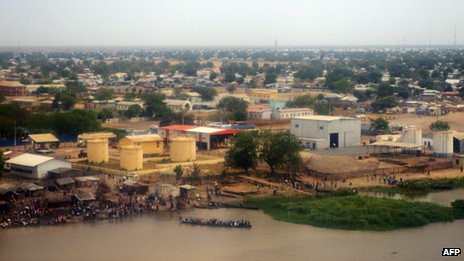
Malakal in South Sudan on east bank of the Nile River. Reports indicate that 200 people drowned trying to escape fighting., a photo by Pan-African News Wire File Photos on Flickr.
South Sudan government orders embattled oil state to keep crude flowing
7:14am EST
By Carl Odera
JUBA (Reuters) - South Sudan has reversed a plan by local authorities to partially shut down oil production and evacuate foreign workers in its main oil-producing region after it was hit last week by the worst fighting since a January ceasefire.
Thousands have been killed and more than 800,000 have fled their homes since fighting began in South Sudan two months ago, triggered by a power struggle between President Salva Kiir and Riek Machar, his former deputy whom he sacked in July.
The warring sides signed the ceasefire on January 23 to end weeks of fighting, but sporadic clashes have continued.
Since Tuesday, the capital of the main oil-producing Upper Nile region, Malakal, has been divided between the army and rebels after forces loyal to Machar raided the town and fought against government troops.
Local officials on Friday ordered the evacuation of foreign oil workers from the Adar and Gumri oil fields, citing security concerns, but the national government overruled them.
"This one was just an irrational decision from the (Upper Nile) state authorities without consultation with the national government," South Sudan's Minister in the Office of the President Awan Guor told Reuters via telephone.
"The presence of rebels in Malakal doesn't mean that our oil fields are in danger right now," he said.
A petroleum ministry official told Reuters on Thursday that national oil production had fallen to about 170,000 barrels per day even before the rebel strike on Malakal, a fall of around a third since the fighting erupted in December.
Upper Nile is the only state pumping oil after production in neighboring Unity state was halted earlier on in the conflict, forcing the government to cut output by about a fifth to around 200,000 bpd.
Malakal lies about 140 km (90 miles) from Paloch, an oil complex where a key crude oil processing facility is situated.
The government wants to avoid further losses from the oil fields, an economic lifeline for Juba and neighboring Sudan, which earns vital hard currency from fees received for use of its oil pipeline.
The fighting in Malakal has cast doubts over the peace talks in Addis Ababa, which have already been delayed by rebel demands for the release of four remaining political detainees and the withdrawal of Ugandan troops from the country.
(Writing by James Macharia; Editing by Raissa Kasolowsky)
No comments:
Post a Comment